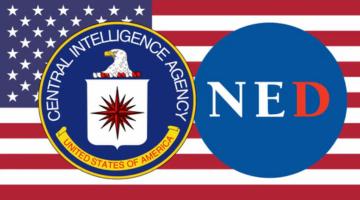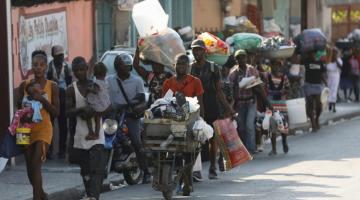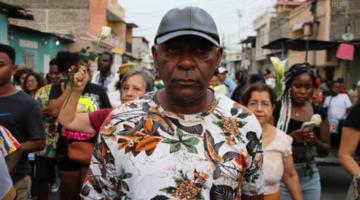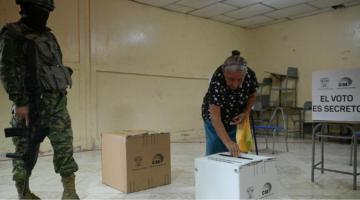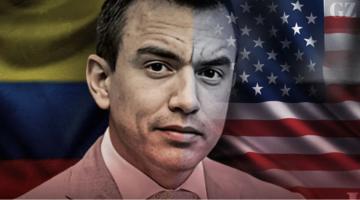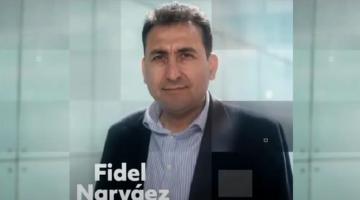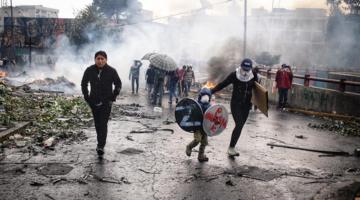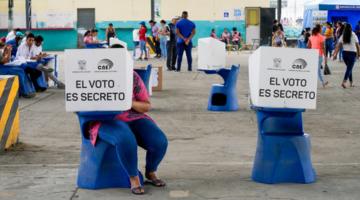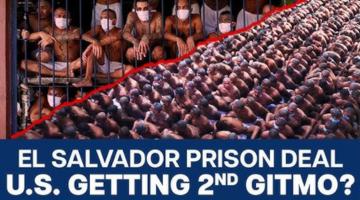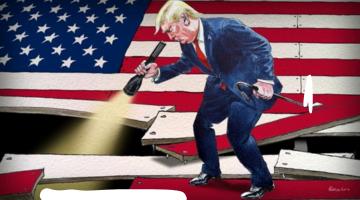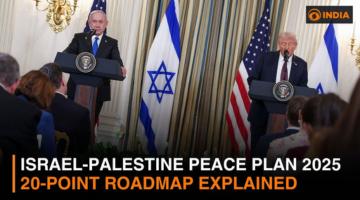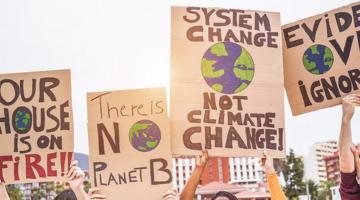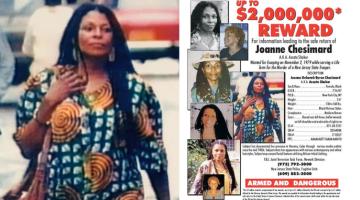Ecuador was once a safe country with some of the best economic prospects in the region. Today, Ecuador has a nearly 500% increase in violent crimes and a marginalized population of poor, African, and indigenous people who find themselves the targets in a war in the South American country.
As Ecuador heads into a very important run-off election on April 13, the issues of security, state violence and the economy remain at the forefront for many Ecuadorians. Dollarization, submission to U.S. dictates, the proliferation of arms shipments through privately owned ports, and the expansion of international drug cartels to justify military presence have all combined to make the living conditions of the poorest unbearable, especially for African and indigenous communities with a constant war directed at them from the militarized structures of the state, like the case of the Guayaquil Four.
Black Agenda Report contributor Clau O’Brien Moscoso interviewed Grayzone correspondent and documentary filmmaker Oscar León on January 6, 2025, less than a month after the disappearance and later confirmed death of the four Afro-Ecuadorian boys in Guayaquil at the hands of sixteen Air Force members. Below is part two of the interview; part one here.
CO: Why Ecuador? Is it about geopolitical strategy or resources that cartels are being used to capture that country? What is it about Ecuador, and not any other place?
OL: I recommend the Grayzone, which reports on this. We dug into this a year ago, and one of the things we discovered is that cartels are no longer that important. The cartels are more like a transnational corporation that sells franchises. The main guy who put together a network in which he externalized each operation in a way that if they get caught, there's no responsibility beyond their own right. For example, if I try to move cocaine in Ecuador and I need security I can call and there's somebody who is a professional in that specific job of transporting cocaine from Guayaquil to Quito or guarding cocaine and stuff, and all those jobs are now taken by the police, the army, and criminal bands.
Which is how we got into this mess. To begin with, if you remember a year ago, there was a declaration of war in Ecuador against the criminal bands. The war is against the poor, because it should be a declaration of war to the cartels - the criminal bands are just a subsidiary paid by and sustained by the cartels. So if I'm saying that I only declared war to criminal bands and not the cartels - it's like me saying I'm fighting the Ukrainian army but just the soldiers not the generals. That is an unwinnable war. There's no way they can disarm these specific bands, because there's an unlimited supply of poor, desperate people. And these bands are local. So all they need to fill is a certain specific job, to organize a new guard for this specific drug depot or something like that. That's why, as long as there's somebody who hires them for the job - those criminal bands are going nowhere and that war is impossible to win.
CO: So in relation to the Daniel Noboa government- at first it was like a few weeks after the disappearance of the boys and only because family members and community organizations, including internationally, pressured them that they were even forced to say something. It does seem like they are trying to pin it just on these 16 military personnel. What do you see? And especially close to the elections? What are his reelection prospects with the outrage people are feeling around this case?
OL: Let's begin with who Daniel Noboa is; he is the son of Álvaro Noboa, who was one of the local oligarchs. Ecuador was always a banana republic and Álvaro Noboa was the banana guy for the United Fruit Company. So basically he was the American heir or manager. That's how he amassed so much power, because his corporations are the ones who put the bananas in Walmart and all these places. They are, in fact, one of the richest families in the whole continent. This is just food for thought, in a very poor place like Ecuador - they own everything.
After the Correa government many of the region’s local oligarchy set up a base in Miami. That lobby inside the US has taken control and weaponized the government to further their own aspirations. So in this case with the Noboa family, and also the Isaias family who was the owner of the bank that defrauded the Ecuadorian people. So this is a huge amount of money with a very proven link all the way from the Miami lobby and other actors to influence the Ecuadorian political system. Their slogan is “Get rid of Correa’s party and the left.”
That's who Noboa is - the reaction of big money to the Correa government and the Latin American left. Noboa was prepared to be a President 10 years before. If you look at his education, what he studied- it's clear that somebody told him, you're going to be a President. He was prepared in the best American universities, Ivy League colleges.
There was a treaty between Ecuador and the US in 2022, in which it outlines how the United States has to help Ecuador. Specifically, they mention in the list a number of challenges and that the US has to help Ecuador control some “external and internal evil influences.” They don't say which ones, but it’s kind of obvious externally it’s Russia and China, and internally the left, the indigenous movement, etc,
Noboa rules over a very divided society where half the society believes the media, and the other half is against Noboa, and even some from the right. They got to see he is basically a mini dictator. In the last month he had a Vice President that was supposed to be in power while he went on the presidential campaign tour. He didn't want to but you have to, because it's the law. He didn't abide by that. He got rid of another right wing candidate that's going to rival him. He's taking very specific steps that show he has a complete disregard for democracy. He's there for securing a political and geopolitical strategy in place that has to do with much more than Ecuadorian politics.
CO: Thank you for the perfect segue. What is the role of the US, specifically via SOUTHCOM and NATO forces in this? In terms of the region there are back to back elections this year and next in Bolivia and Peru. And in a lot of ways we see that the Pacific Coast is being militarized, from Colombia, Ecuador, Peru and Chile. What do you see happening here?
OL: Thirteen years ago there was a challenge proposed against the US by Hugo Chavez, Rafael Correa and other leftists elected as presidents. They very publicly challenged Washington, but I don't think they were very conscious of what they were doing, because they didn't understand that the US, the intelligence agencies, the Pentagon, etc. are in charge of everything. What’s happening now is a response to that thing that happened back in 2012, when the left was about to take the continent democratically and what we see now is a huge cultural war that was pretty much won by the US and the local right.
What happens is that there's so many poor people in South America it’s an almost impossible task to keep the left away from the government. But through judicialization, lawfare and the press, the US has many strategies to subvert those left wing governments. Like what you see with Luis Arce in Bolivia, what you saw with Lenin Moreno. Even if the left wins, sometimes they end up turning.
Noboa is pretty much the strong hand they have in office. But how are the international banks and military connected to the cartels? At the end of the day if you go to the streets to buy drugs, you cannot buy that with a credit card, only cash. So that means that year after year, month after month, week after week, a huge amount of cash goes out of the system and it's the banks and the government's responsibility and job to bring that cash back to the system. There's enough cash, and they don't have to print more. It’s what many say happened in the 2008 crash with the narcos involved in the investigation into Wachovia Bank (acquired by Wells Fargo during that crash) financing major cartels in Mexico. The banks were trying to borrow cash from each other, and there was nothing. It's because illegal cash is not going back into the system. So it begs the question how much really is the Ecuadorian government fighting the cartels? Or why are they fighting cartels but not these criminal banks?
CO: How do you see that the people and organized communities are even able to confront these powers that are against them? That isn't just coming from the immediate military and police, but also coming from above and from the US Embassy. How do the masses respond?
OL: It's complicated because the genius of the right wing in Latin America is to construct the left as if it's the oppressor and you got a bunch of poor people thinking they're the joker and they're revolutionaries. When in reality, if you look back, the States are being oppressed by the larger right wing powers, which are the banks and the corporations. So the Latin American right has been in the US with Trump, has been successful in the cultural war because they constructed the left as if it's the oppressor as well. When in reality, if you go to the definition in the dictionary, you have the left as the workers and the right as capital. That's just that's where it ends. That's the definition.
But the right has made it seem as if the workers are the oppressors and that's how they won elections. That's how Javier Milei won in Argentina. That's how Trump won in the US. That's how Noboa won, because those are countries where there's many more poor and young people, meaning many more Leftist voters than rich and middle class. So how did they manage to win this culture war? It is in this construct, taking advantage of the many mistakes that their left wing government committed, who make mistakes, and there is corruption for sure, just like in any other government. I'm not saying it's fine, but it is not uncommon.
But right now you have a narco government. Ecuador is basically a narco state and people don't see that. But they do remember the Correa government as corrupt. There's a huge division in the streets. People think that the right wing is the answer. So that's where the problem is, because ten years ago in Ecuador, had they done the same by now they would have been kicked out of the government. I myself have seen 3 revolutions, made a documentary about one. In ten years we had ten presidents. That means the government was scared of the people.
The process we see right now is the US taking control of the legal system. That's why there are laws in Ecuador, like the terrorism laws, to prevent all those uprisings that take down governments that were so common. In fact, the last two uprisings failed because they didn't take down the government when that was the norm before. The power is being taken away from people, no doubt, and it's landing in the hands of the corporations, banks, mining and oil companies.
It's a serious situation because there's an election in February (first round). And if you can imagine it, Noboa has about 50% of the vote even though there was no electricity all year. It's a complicated situation because organized labor is divided and the indigenous movement and Correista movement are very separated from each other. Ecuador itself is pro-nature, but it's turned into a pro-mining country; sucking the life out of the rivers. That's the perspective of the workers - it is not looking good at all. They have division in the ranks and they have the media against them.
The right has the power of the US via Noboa. First of all we’ll see if it's a clean election. But also, we need nationalism in Ecuador from both sides of the aisle, left and right to resist Noboa, who's clearly with the corporations.
**En Español**
Mientras Ecuador se acerca a una segunda vuelta electoral muy importante el 13 de abril, los temas de seguridad, violencia estatal y la economía siguen siendo prioritarios para muchos ecuatorianos. La dolarización, la sumisión a los dictados de EE.UU., la proliferación de envíos de armas a través de puertos privados y la expansión de los carteles internacionales de droga —utilizados para justificar una mayor presencia militar— han combinado sus efectos para hacer insoportables las condiciones de vida de los más pobres, especialmente para las comunidades afro e indígenas, que enfrentan una guerra constante dirigida contra ellas por las estructuras militarizadas del Estado, como en el caso de los Cuatro de Guayaquil.
El 6 de enero de 2025, menos de un mes después de la desaparición y posterior confirmación de la muerte de los cuatro jóvenes afroecuatorianos en Guayaquil a manos de dieciséis miembros de la Fuerza Aérea, la colaboradora de Black Agenda Report Clau O’Brien Moscoso entrevistó al corresponsal de The Grayzone y cineasta documentalista Oscar León. A continuación, la segunda parte de la entrevista (la primera parte está disponible aquí).
CO: ¿Por qué Ecuador? ¿Se trata de una estrategia geopolítica o de recursos que los carteles buscan controlar? ¿Qué tiene Ecuador que no tenga otro lugar?
OL: Recomiendo The Grayzone, que hemos investigado esto. Hace un año descubrimos que los carteles ya no son tan importantes en sí mismos. Ahora funcionan como corporaciones transnacionales que venden franquicias. El cerebro detrás de esto creó una red donde cada operación se externaliza: si alguien es capturado, no hay responsabilidad más allá de ese eslabón. Por ejemplo, si quiero mover cocaína en Ecuador y necesito seguridad, puedo contratar a un especialista en transporte de droga entre Guayaquil y Quito, o en custodia de cargamentos. Y esos roles ahora los ocupan la policía, el ejército y bandas criminales.
Así llegamos a este desastre. Hace un año, se declaró una "guerra contra las bandas criminales" en Ecuador, pero en realidad es una guerra contra los pobres, porque las bandas son solo subsidiarias financiadas por los carteles. Es como decir que luchas contra el ejército ucraniano, pero solo contra los soldados, no contra los generales. Es una guerra imposible de ganar: mientras haya pobres desesperados, las bandas se regenerarán. Son grupos locales que solo necesitan cubrir roles específicos, como vigilar un depósito de droga. Mientras alguien los contrate, esas bandas no desaparecerán.
CO: Sobre el gobierno de Daniel Noboa: al principio, solo hablaron de la desaparición de los jóvenes semanas después, y porque familiares y organizaciones, incluso internacionales, los presionaron. Parece que quieren culpar solo a esos 16 militares. ¿Qué opinas? Y, cerca de las elecciones, ¿cómo afecta el escándalo a sus posibilidades de reelección?
OL: Empecemos por quién es Daniel Noboa: hijo de Álvaro Noboa, un oligarca local. Ecuador siempre fue una república bananera, y Álvaro era el "hombre del banano" para la United Fruit Company. Básicamente, era el administrador o heredero estadounidense. Así acumuló poder: sus empresas son las que abastecen de bananos a Walmart y otros. De hecho, son una de las familias más ricas del continente. En un país tan pobre como Ecuador, ellos lo controlan todo.
Tras el gobierno de Correa, muchos oligarcas regionales se establecieron en Miami. Ese lobby en EE.UU. ha tomado el control y ha instrumentalizado al gobierno para sus intereses. Con los Noboa pasa igual, igual que con la familia Isaias, dueña del banco que estafó al pueblo ecuatoriano. Hay mucho dinero y vínculos comprobados entre ese lobby en Miami y otros actores para influir en la política ecuatoriana. Su consigna es: "Eliminar al partido de Correa y a la izquierda".
CO: Así que así es Noboa: la reacción del gran capital contra el gobierno de Correa y la izquierda latinoamericana. Noboa fue preparado para ser presidente desde hace una década. Si miras su educación, lo que estudió, está claro que alguien le dijo: "Tú serás presidente". Lo prepararon en las mejores universidades estadounidenses, en la Ivy League.
En 2022, hubo un tratado entre Ecuador y EE.UU. que establece cómo Estados Unidos debe "ayudar" a Ecuador. Específicamente, menciona una serie de "desafíos" y exige que EE.UU. asista al país para controlar ciertas "influencias malignas externas e internas". No las especifican, pero es obvio: externamente son Rusia y China, e internamente, la izquierda, el movimiento indígena, etc.
Noboa gobierna una sociedad profundamente dividida: una mitad cree en los medios tradicionales, y la otra lo rechaza, incluyendo a sectores de derecha que ya ven en él a un “mini dictador". En el último mes, tuvo que dejar temporalmente el poder a su vicepresidenta para hacer campaña (por ley), pero se negó. Además, eliminó a un rival de derecha que lo desafiaría. Son pasos calculados que muestran su desprecio por la democracia. Está ahí para asegurar una estrategia política y geopolítica que va mucho más allá de Ecuador.
CO: Gracias por el enlace perfecto. ¿Cuál es el papel de EE.UU., específicamente de SOUTHCOM y la OTAN, en esto? Con elecciones consecutivas este año en Bolivia y Perú, vemos una creciente militarización de la costa del Pacífico, desde Colombia hasta Chile. ¿Qué está pasando?
OL: Hace 13 años, Hugo Chávez, Rafael Correa y otros presidentes de izquierda desafiaron públicamente a Washington. Pero no eran del todo conscientes de que las agencias de inteligencia y el Pentágono controlan todo. Lo que ocurre ahora es la respuesta a ese momento (2012), cuando la izquierda casi tomó el continente democráticamente. Hoy, EE.UU. y la derecha local han ganado la guerra cultural.
El problema es que hay tantos pobres en Sudamérica que es casi imposible mantener a la izquierda fuera del poder. Pero mediante lawfare (guerra judicial), medios y otras estrategias, logran subvertir gobiernos progresistas. Como vemos con Luis Arce en Bolivia o el traidor Lenin Moreno en Ecuador. Incluso si la izquierda gana, a veces terminan claudicando.
Noboa es su "hombre fuerte" en el poder. Pero ¿cómo se conectan los bancos internacionales y los militares con los carteles? Al final, el narcotráfico mueve dinero en efectivo, no con tarjetas. Ese efectivo sale del sistema y son los bancos y gobiernos los que deben reintegrarlo. Así evitan imprimir más billetes. Pasó en 2008 con el escándalo del Wachovia Bank (absorbido por Wells Fargo), que financió carteles mexicanos. Cuando los bancos colapsaron, no había liquidez porque el dinero ilegal no volvía al sistema. Entonces, ¿realmente el gobierno ecuatoriano lucha contra los carteles? ¿O solo contra las bandas, no contra los bancos criminales?
CO: ¿Cómo pueden las comunidades organizadas confrontar estos poderes que no solo vienen de la policía y militares, sino también de la Embajada de EE.UU.?
OL: Es complejo. La genialidad de la derecha ha sido convencer a los pobres de que la izquierda es el opresor. Han invertido los términos: según ellos, los trabajadores oprimen al capital, cuando el diccionario define a la izquierda como los trabajadores y a la derecha como el capital. Así ganaron las elecciones con Milei en Argentina, Trump en EE.UU., Noboa en Ecuador. Países con más pobres que ricos, pero donde la derecha explotó los errores de gobiernos de izquierda (que los hay, como en cualquier gobierno) para demonizarlos.
Ahora Ecuador es un narcoestado, pero la gente no lo ve. Solo recuerdan a Correa como "corrupto". Hay división: muchos creen que la derecha es la solución. Hace una década, un gobierno así habría sido derrocado. Yo viví 3 revoluciones y filmé un documental sobre una. En 10 años, tuvimos 10 presidentes: el poder temía al pueblo.
Hoy, EE.UU. controla el sistema legal. Las leyes antiterrorismo en Ecuador buscan evitar levantamientos populares. Los últimos dos fracasaron, cuando antes eran la norma. El poder se traslada a corporaciones, bancos y mineras.
La situación es grave: Noboa tiene un 50% de intención de voto pese a los apagones de este año. El movimiento indígena y el correísmo están divididos. Ecuador era pro-naturaleza, pero ahora es pro-minería: se secan los ríos. Los trabajadores están fragmentados y los medios en su contra.
La derecha tiene el poder de EE.UU. a través de Noboa. Primero, veremos si las elecciones son limpias. Pero se necesita nacionalismo de izquierda y derecha para resistir a Noboa, claramente al servicio de las corporaciones.
Clau O'Brien Moscoso is an organizer and co-coordinator of the Black Alliance for Peace Haiti/Americas Team. Originally from Barrios Altos, Lima, she grew up in Kearny, New Jersey. She attended college, lived, and organized in New York City for 15 years, and is now based in Lima, Perú, writing about Latin America and the Caribbean for the Black Agenda Report.


